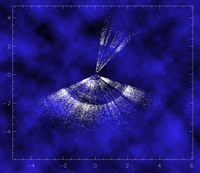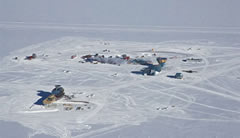

Ed Turano recently joined Berkeley Lab as the Senior Strategic Planner, reporting to Acting Laboratory Deputy Director Jay Keasling. Turano succeeds Michael Chartock, who joined the Lab in 1985 and continued to serve as the strategic planner even after retiring in 2008.
Turano brings a diverse background and set of skills to his new role. Born and raised on Long Island, Turano completed his undergraduate, masters, and doctorate degrees—all in physics—at the University of Rochester. His Ph.D. research was in laser-plasma physics. He spent nine years at Lawrence Livermore National Laboratory, where he first completed postdoctoral studies, was later appointed as a physicist, and in 2005 moved to the director’s office, where he focused on lab-wide strategic planning. In 2007, he joined the Defense Threat Reduction Agency as a member of the Senior Executive Service. During his time leading the Nuclear Technologies Directorate, Turano’s programs saw $180 million in above-budget funding and two R&D 100 Awards.
Turano brings a broad network of professional relationships to his role at Berkeley Lab, including the Office of Science and Technology Policy, the Department of Homeland Security, and the Department of Energy/NNSA. His technical expertise spans a wide area of research including accelerator physics, laser-plasma physics, and nuclear physics.
"I'm thrilled to be at Berkeley Lab,” he says. “This is a rich environment with exciting people and programs. I look forward to meeting as many people as possible and assuring that the Lab's planning activities enhance all the terrific work being done here."
Asked why he wanted to join Berkeley Lab, Turano says: “I love basic science, and I wanted a closer connection to it. Also, energy research has been a passion of mine throughout my career, going all the way back to my days in graduate school.”
 BOSS, the 160-member Baryon Oscillation Spectroscopic Survey, began survey operations at the Sloan Digital Sky Survey’s 2.5-meter telescope in New Mexico last December and by this week had acquired 200,000 survey-quality spectra of galaxies and quasars. The plan is for 2 million spectra by June 2014 and the best galaxy map ever made. Even when it’s finished, says principal investigator David Schlegel, “Most of the universe will still not be mapped, except whatever's being done by our alien counterparts in other parts of the universe.” Schlegel, survey scientist Martin White, and instrument scientist Natalie Roe are with the Physics Division. More>
BOSS, the 160-member Baryon Oscillation Spectroscopic Survey, began survey operations at the Sloan Digital Sky Survey’s 2.5-meter telescope in New Mexico last December and by this week had acquired 200,000 survey-quality spectra of galaxies and quasars. The plan is for 2 million spectra by June 2014 and the best galaxy map ever made. Even when it’s finished, says principal investigator David Schlegel, “Most of the universe will still not be mapped, except whatever's being done by our alien counterparts in other parts of the universe.” Schlegel, survey scientist Martin White, and instrument scientist Natalie Roe are with the Physics Division. More>
 The International Center for Computational Science (ICCS) is a new international collaboration aimed at creating computational tools to help scientists make more effective use of new computing technologies, including multicore processors. ICCS is located at Berkeley Lab and UC Berkeley, with partners at the University of Heidelberg in Germany and the National Astronomical Observatories of the Chinese Academy of Sciences in China. More>
The International Center for Computational Science (ICCS) is a new international collaboration aimed at creating computational tools to help scientists make more effective use of new computing technologies, including multicore processors. ICCS is located at Berkeley Lab and UC Berkeley, with partners at the University of Heidelberg in Germany and the National Astronomical Observatories of the Chinese Academy of Sciences in China. More>
 [MarketWatch] Buried two kilometers under solid ice on one of the coldest continents on Earth, Analog Devices' data converters and amplifiers are helping scientists at the South Pole build the world's largest telescope to search for the smallest subatomic particles known to humankind. The innovative "underground" telescope project is called IceCube and uses a cubic kilometer of pure, ultra-translucent ice at the South Pole as a telescopic "window" or particle detector to search the universe for its smallest known particles, called neutrinos. Physicist Jerry Przyblski is quoted in the article. More>
[MarketWatch] Buried two kilometers under solid ice on one of the coldest continents on Earth, Analog Devices' data converters and amplifiers are helping scientists at the South Pole build the world's largest telescope to search for the smallest subatomic particles known to humankind. The innovative "underground" telescope project is called IceCube and uses a cubic kilometer of pure, ultra-translucent ice at the South Pole as a telescopic "window" or particle detector to search the universe for its smallest known particles, called neutrinos. Physicist Jerry Przyblski is quoted in the article. More>
 Beginning today all shipments for FedEx, UPS, or DHL will be handled through Point and Ship, the Lab's new online shipping system. This new system replaces the five-part shipping document, paper airbills, and FedEx.com accounts. All FedEx accounts will be closed and anyone wishing to ship must use the Point and Ship system. Training in the new system will be offered today at 10 a.m. in the Bldg. 50 Auditorium and 1:30 p.m. in the Bldg. 66 Auditorium. Policy and Procedure training can be found here and must be completed before access to Point and Ship will be granted.
Beginning today all shipments for FedEx, UPS, or DHL will be handled through Point and Ship, the Lab's new online shipping system. This new system replaces the five-part shipping document, paper airbills, and FedEx.com accounts. All FedEx accounts will be closed and anyone wishing to ship must use the Point and Ship system. Training in the new system will be offered today at 10 a.m. in the Bldg. 50 Auditorium and 1:30 p.m. in the Bldg. 66 Auditorium. Policy and Procedure training can be found here and must be completed before access to Point and Ship will be granted.
 Ronald M. Krauss, Senior Scientist at Children’s Hospital Oakland Research Institute (CHORI) and Guest Senior Scientist at Berkeley Lab, is recruiting non-smoking men and postmenopausal women to participate in a six-week dietary intervention study being conducted at CHORI. The “Dietary Effects on Large Lipoproteins (DELL)” study seeks to determine the effect of saturated fat on cholesterol and lipoprotein levels in individuals with the atherogenic lipoprotein phenotype. If you would like more information or to take a survey to see if you may qualify, click here, or contact [email protected], (866) 513-1118 (toll free).
Ronald M. Krauss, Senior Scientist at Children’s Hospital Oakland Research Institute (CHORI) and Guest Senior Scientist at Berkeley Lab, is recruiting non-smoking men and postmenopausal women to participate in a six-week dietary intervention study being conducted at CHORI. The “Dietary Effects on Large Lipoproteins (DELL)” study seeks to determine the effect of saturated fat on cholesterol and lipoprotein levels in individuals with the atherogenic lipoprotein phenotype. If you would like more information or to take a survey to see if you may qualify, click here, or contact [email protected], (866) 513-1118 (toll free).
Is the time your computer spends analyzing data getting out of hand? Have you heard about graphical processor unit (GPU) computing but don’t know where to begin? Attend a workshop on GPU computing on July 30 in Perseverance Hall. The workshop will present an introduction to GPU computing and how to utilize it. Speakers from Nvidia, AccelerEyes, and Tech-X will discuss how to perform GPU computing and future developments. Scientists already doing GPU computing will discuss how they apply it in their work. Employees interested in the technology, or who already have experience with it, are invited to give a quick overview of their work. The workshop will conclude with hands-on tutorials. The event is free. Register here. Go here for more information.
Today
at Berkeley Lab encourages feedback and story ideas
Deadline for submissions is 10 a.m. two days prior to publication
TABL is produced by Public Affairs' Communications Group